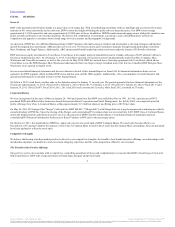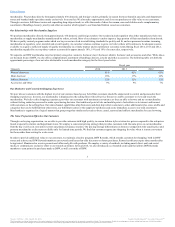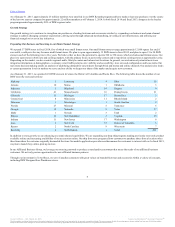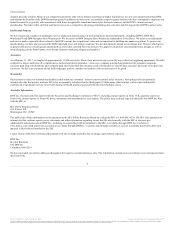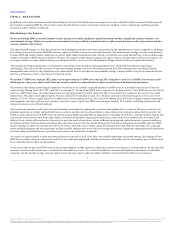DSW 2014 Annual Report Download - page 15
Download and view the complete annual report
Please find page 15 of the 2014 DSW annual report below. You can navigate through the pages in the report by either clicking on the pages listed below, or by using the keyword search tool below to find specific information within the annual report.
Table of Contents
We rely on foreign sources for our merchandise, and our business is therefore subject to risks associated with international trade.
We purchase merchandise from domestic and foreign vendors. In addition, many of our domestic vendors import a large portion of their merchandise from
abroad, primarily from China, Brazil and Italy. We believe that almost all the merchandise we purchased during fiscal 2014 was manufactured outside the
United States, and the majority was manufactured in China. For this reason, we face risks inherent in purchasing from foreign suppliers, such as: economic
and political instability in countries where these suppliers are located; international hostilities or acts of war or terrorism affecting the United States or foreign
countries from which our merchandise is sourced; increases in shipping costs; transportation delays and interruptions, including increased inspections of
import shipments by domestic authorities; work stoppages; U.S. laws affecting the importation of goods, including duties, tariffs and quotas and other non-
tariff barriers; expropriation or nationalization; changes in foreign government administration and governmental policies; changes in import duties or
quotas; compliance with trade and foreign tax laws; and local business practices, including compliance with foreign laws and with domestic and
international labor standards.
We require our vendors to operate in compliance with applicable laws and regulations and our internal requirements. However, we do not control our vendors
or their labor and business practices. The violation of labor or other laws by one of our vendors could have a material adverse effect on our business.
Restrictions in our secured revolving credit facility and letter of credit agreement could limit our operational flexibility.
We have a $50 million secured revolving credit agreement and a $50 million letter of credit agreement with terms expiring July 2018 and August 2018,
respectively. The secured revolving credit agreement is secured by a lien on substantially all of our personal property assets and its subsidiaries with certain
exclusions and may be used to provide funds for general corporate purposes, to provide for ongoing working capital requirements, and to make permitted
acquisitions. In addition, both the secured revolving credit agreement and the letter of credit agreement contain restrictive covenants relating to our
management and the operation of our business. These covenants, among other things, limit or restrict our ability to grant liens on our assets, limit our ability
to incur additional indebtedness, limit our capital expenditures to $200 million annually (the secured revolving credit agreement only), limit our ability to
enter into transactions with affiliates and limit our ability to merge or consolidate with another entity. These covenants could restrict our operational
flexibility, and any failure to comply with these covenants or our payment obligations would limit our ability to borrow under the secured revolving credit
facility and, in certain circumstances, may allow the lenders thereunder to require repayment.
Uncertain economic conditions in the United States and other world events can adversely affect consumer confidence and consumer spending habits, which
could result in reduced net sales.
Consumer spending habits, including spending for the footwear and accessories that we sell, are affected by, among other things, prevailing economic
conditions, levels of employment, salaries and wage rates, prevailing interest rates, income tax rates and policies, consumer confidence and consumer
perception of economic conditions. In addition, consumer purchasing patterns may be influenced by consumers’ disposable income. Consumer confidence is
also affected by the domestic and international political situation. The outbreak or escalation of war, natural disasters, or the occurrence of terrorist acts or
other hostilities in or affecting the United States, could lead to a decrease in spending by consumers. In an economic slowdown, we could experience lower
net sales than expected on a quarterly or annual basis and be forced to delay or slow our expansion plans. Reduced net sales may result in reduced operating
cash flows if we are not able to appropriately manage inventory levels or leverage expenses. These negative economic conditions could have a material
adverse effect on our business.
Our cash and investments are subject to risks that could affect the liquidity of these investments.
As of January 31, 2015, we had cash and investments of approximately $447 million. A portion of these are held as cash in operating accounts that are with
third-party financial institutions. While we regularly monitor the cash balances in our operating accounts and when possible adjust the balances as
appropriate to be within Federal Deposit Insurance Corporation (“FDIC”) insurance limits, these cash balances could be lost or inaccessible if the underlying
financial institutions fail or are subject to other adverse conditions in the financial markets.
While we generally invest in lower risk investments, investment risk has been and may further be exacerbated by credit and liquidity issues that have affected
various sectors of the financial markets. Our access to cash and investments, their earning potential or our ability to invest in highly rated, low risk
investments may be impacted by adverse conditions in the U.S. financial markets. These market risks associated with our cash and investments could have a
material adverse effect on our business.
11
Source: DSW Inc., 10-K, March 26, 2015 Powered by Morningstar® Document Research℠
The information contained herein may not be copied, adapted or distributed and is not warranted to be accurate, complete or timely. The user assumes all risks for any damages or losses arising from any use of this information,
except to the extent such damages or losses cannot be limited or excluded by applicable law. Past financial performance is no guarantee of future results.



